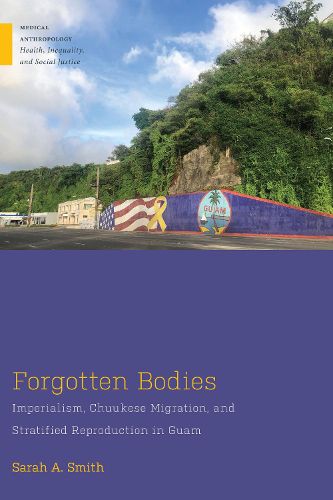Readings Newsletter
Become a Readings Member to make your shopping experience even easier.
Sign in or sign up for free!
You’re not far away from qualifying for FREE standard shipping within Australia
You’ve qualified for FREE standard shipping within Australia
The cart is loading…






Women from Chuuk, Federated States of Micronesia, who migrate to Guam, a U.S. territory, suffer disproportionately poor reproductive health outcomes. Though their access to the United States is unusually easy, through a unique migration agreement, it keeps them in a perpetual liminal state as nonimmigrants, who never fully belong as part of the United States Chuukese women move to Guam, sometimes with their families but sometimes alone, in search of a better life: for jobs, for the education system, or to access safe health care. Yet, the imperial system they encounter creates underlying conditions that greatly and disproportionately impact their ability to succeed and thrive, negatively impacting their reproductive health. Through clinical and community ethnography, Sarah A. Smith illuminates the way this system stratifies women's reproduction at structural, social, and individual levels. Readers can visualize how U.S. imperialist policies of benign neglect control the body politic, change the social body, and render individual bodies vulnerable in the twenty-first century but also how people resist.
$9.00 standard shipping within Australia
FREE standard shipping within Australia for orders over $100.00
Express & International shipping calculated at checkout
Women from Chuuk, Federated States of Micronesia, who migrate to Guam, a U.S. territory, suffer disproportionately poor reproductive health outcomes. Though their access to the United States is unusually easy, through a unique migration agreement, it keeps them in a perpetual liminal state as nonimmigrants, who never fully belong as part of the United States Chuukese women move to Guam, sometimes with their families but sometimes alone, in search of a better life: for jobs, for the education system, or to access safe health care. Yet, the imperial system they encounter creates underlying conditions that greatly and disproportionately impact their ability to succeed and thrive, negatively impacting their reproductive health. Through clinical and community ethnography, Sarah A. Smith illuminates the way this system stratifies women's reproduction at structural, social, and individual levels. Readers can visualize how U.S. imperialist policies of benign neglect control the body politic, change the social body, and render individual bodies vulnerable in the twenty-first century but also how people resist.